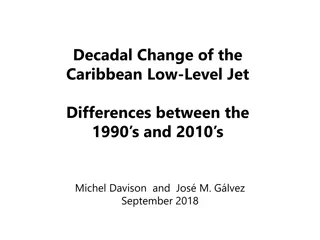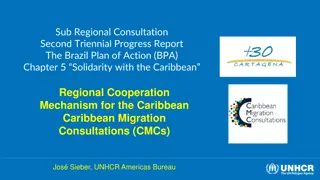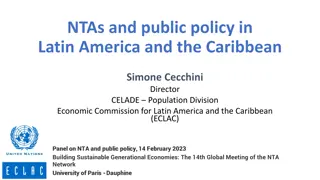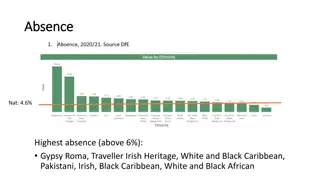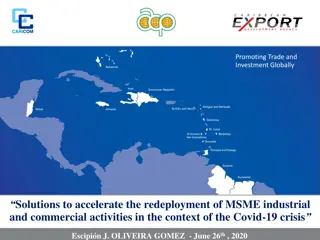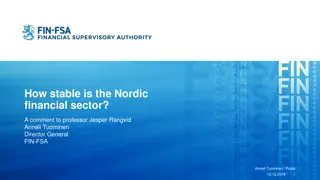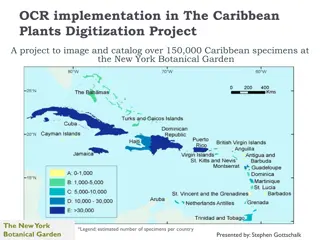Financial Stability in the Caribbean: Challenges and Recommendations
The 13th IADI Annual Conference in the Caribbean focused on updating core principles to strengthen the financial stability architecture. Topics discussed included key elements for an effective resolution regime for banks, overview of the banking system in the region, bank resolution failures, and challenges in resolution and insolvency frameworks. Recommendations were made to enhance the existing frameworks based on international standards and cooperation among relevant authorities.
Download Presentation

Please find below an Image/Link to download the presentation.
The content on the website is provided AS IS for your information and personal use only. It may not be sold, licensed, or shared on other websites without obtaining consent from the author. Download presentation by click this link. If you encounter any issues during the download, it is possible that the publisher has removed the file from their server.
E N D
Presentation Transcript
Specific Reference to the Caribbean Region 13th IADI Annual Conference Updated Core Principles to Strengthen the Financial Stability Architecture October 22-23, 2014 Antoinette McKain, CEO Jamaica Deposit Insurance Corporation 1
Outline Key elements for an effective resolution regime for Banks Overview of the banking system in the Caribbean Bank resolution/failures - last 3 decades in selected Caribbean countries Resolution and insolvency frameworks in the Caribbean: Overview Challenges/ Gaps Recommendations to enhance the frameworks 2
International Standards: Key Elements for an Effective Resolution Regime Financial Stability Board Key Attributes of Effective Resolution Regimes for Financial Institutions (2011) IADI/BCBS Basel Core Principles of Banking Supervision (2012) Core Principles for Effective Deposit Insurance Systems (2014) 1. Mechanisms for early detection and timely intervention/prompt corrective action 2. Special resolution regime 3. Designated authority (ies) for exercising resolution powers 4. Broad range of resolution options & powers 5. Cooperation among relevant authorities - domestic & cross border 3
Overview of the Banking System The financial system in the Caribbean is largely bank- based (onshore and offshore banking) Offshore banking is the largest subsector in the financial system (Barbados , Bahamas, BVI, ECCU & Belize) Non-bank financial institutions consist of credit unions; insurance companies ; and securities firms 4
Table 1: Structure of Financial System: Total Assets (US$ millions) ECCU Barbados Bahamas BVI* Jamaica** T&T Belize Guyana 12,100 8,724 17,891 1,319 1,590 9,509 6,240 2,500 Banks D.N.A. D.N.A D.N.A. 2,800 5,226 449 4,232 5,670 Local D.N.A. D.N.A D.N.A. 570 9,300 3,498 5,277 870 Foreign D.N.A 2,402 301 42,638 582,900 n/a n/a n/a Offshore banks D.N.A 300 526 1,524 306 21 682 842 Credit Unions D.N.A 2,500 2511 4,768 97 157 637 1,521 Insurance Companies D.N.A D.N.A D.N.A D.N.A D.N.A D.N.A D.N.A. 4,674 Securities firm 13,230 57,480 597,800 2,500 16,435 24,183 2,023 1,768 Total D.N.A. Data not available, n/a. Not applicable Source: IMF WP/13/175 and country authorities 5
Overview of the Banking System Total assets in the banking system as a percentage of gross domestic product is a measure of financial depth of an economy Total assets of the Banking system (excluding off-shore) represents approximately 91 percent of regional GDP Total assets of the financial sector (excluding offshore banks) amounts to 124 percent of the regional GDP (IMF Working paper 13/175 - Financial Interconnectedness and Financial Section reforms in the Caribbean) 6
Table 2: Structure of Banking System: Total Assets to GDP (%) ECCU Barbados Bahamas BVI Jamaica T&T Belize Guyana 176 136 150 268 68 73 89 64 Banks D.N.A. D.N.A. D.N.A 79 123 35 41 30 Local D.N.A. D.N.A. D.N.A 98 12 115 27 59 Foreign D.N.A 45 928 7220 n/a n/a 20 n/a Offshore banks 221 1064 7370 268 68 73 109 64 Total D.N.A. Data not available, n/a. Not applicable Source: IMF WP/13/175 and calculations from country authorities 7
Overview of the Banking System GDP to Bank Assets Global Comparison Country Banking Assets as a Percentage of GDP Barbados* 136% Bahamas 150% Canada 214 % Jamaica 68 % Trinidad & Tobago* 73% United Kingdom 463% United States 88 % *IMF WP/13/175, country calculations 2013 8
Overview of the Banking System Interconnectivity and dominance of regional banks: Royal Bank of Canada, Canadian Imperial Bank of Commerce, Republic Bank and Scotia Bank Foreign banks account for approximately 60% of banking assets in the region (primarily Canadian banks) Most banks are connected to non-bank financial institutions in the investments/securities, insurance and real estate sectors through common ownership. 9
Table 3: Financial Sector Connectivity in the Caribbean Related Non- Banking Operations Number of Countries Deposit Taking Institutions Countries Anguilla, Antigua and Barbuda, Aruba, Bahamas, Barbados, Belize, British VI, Cayman, Dominica, Dominican Republic, Grenada, Guyana, Haiti, Jamaica, St Lucia, St Kitts, St Vincent and the Grenadines, Trinidad & Tobago, Turks and Caicos, St Maarten Insurance, Investments Bank of Nova Scotia Ltd 20 Antigua, Aruba, Bahamas, Turks & Caicos, Barbados, Bonaire, Cayman Islands, Curacao, Dominica, Montserrat, St Kitts, St Lucia, St Maarten, Suriname and Trinidad & Tobago. Investments & Insurance RBC Royal Bank Ltd 14 Insurance, Investments, Real Estate Barbados, Cayman, St Lucia, Jamaica, Trinidad & Tobago, Netherland Antillies, Bahamas, and Turks and Caicos CIBC FirstCaribbean Bank Ltd 8 Barbados, Cayman, Grenada, Guyana and Trinidad & Tobago Republic Bank Limited Securities 5 Insurance, Investments, Property Services & Employee Benefits Administration Sagicor Bank Jamaica Jamaica, St Lucia, Cayman and Costa Rica 4 Bahamas, Barbados, Cayman, Dominican Republic Haiti, Jamaica and Trinidad & Tobago 10 CitiBank N.A. 7
Bank Resolution over the last 30 years in Selected Caribbean Countries Country Bank Resolution Mechanism Approximate Cost to the System Financial Sector Crisis, 1990 s included several banks and non- banks The Financial Sector Adjustment Company Limited (FINSAC) was created on January 29, 1997 to treat with financial sector problems. Resolution strategies for Banks included temporary management, capital injection in exchange for equity/assets; purchase and assumption; divestment; acquisitions. 40% of GDP/ US$9.7 billion (1998) Jamaica mergers and Bank of Credit & Commerce International 1991 Operations of Jamaican branch suspended by the MOF, following the Bank of England's directive. Deposits were fully repaid and operations closed. Not available Barbados Bank of Credit & Commerce International (BCCI) 1991 Central Bank of Barbados intervened and seized BCCI. In 1993, Mutual Bank of the Caribbean Inc. was set up by the Central Bank to manage the sale of BCCI. (In 1991 Bank of England ordered the bank to close its global operations) Not available 11
Bank Resolution over the last 30 years in Selected Caribbean Countries Country Bank Resolution Mechanism Approximate Cost to the System Several during the period 1986 -1993 banks A combination of resolution strategies were employed, including liquidation. Not available Trinidad and Tobago CLICO Investment Bank 2009 Central Bank intervention and Liquidation. Depositor reimbursement by DICTT & government guaranteed payments Over billion to date - CLICO Group US$3 Antigua Bank of Antigua (owned Stanford Financial Group) 2009 ECCB intervened through recapitalization and liquidity support. ECCB s intervention facilitated the acquisition of certain assets and liabilities of BOA by Eastern Caribbean Amalgamated Bank in 2010 which is currently in operation. Not available. ECCB loan to Govt. Antigua Barbuda approx million by of and US$33 12
Bank Resolution over the last 30 years in Selected Caribbean Countries - Causes Inadequate regulation and enforcement/ supervision on the part of bank supervisors and regulators Unsound banking practices Poor corporate governance Weak legal framework, judicial and criminal investigation system Rapid expansion of companies within conglomerates and complex group structures 13
Overview of the Current Legal and Supervisory Framework for Banks Some common features of the current legal and supervisory framework for banks in Bahamas, Barbados, Bermuda; British Virgin Islands, Jamaica, Trinidad and Tobago and OECS: The legal framework is generally clear on responsibilities and objectives for each authority involved in the supervision of banks (Supervision devolved - Central Bank; Monetary Authority; The Financial Services Commission) Banking laws confer powers on bank supervisors to prescribe prudential and other requirements; take corrective and sanctioning actions As between the Supervisors and the DI there are a range of respective intervention and resolution powers and at times resolution powers are also vested in the Cabinet Minister responsible for the financial affairs of the country. Where it exists the legal framework is generally clear on the responsibilities of deposit insurers 14
Insolvency Laws Governing Banks in the Caribbean There are no special insolvency regime for banks in the countries examined. The general insolvency framework for companies and administered by the court is applicable for winding-up insolvent banks. Deposit Insurers (in T&T, Jamaica, Barbados and Bahamas) may act as liquidator or receiver for the winding-up of banks however only when advised or guided by the Central Bank and /or the Minister of Finance; or the courts as is the case for the respective country. 15
Insolvency Laws Governing Banks in the Caribbean Bermuda monetary authority has proposed a framework for a special resolution regime for banks licensed in Bermuda. The Bill seeks to provide the authorities with the necessary stabilisation powers to transfer part or all of a failing bank s business to a private sector purchaser, assume control of part or all of a failing bank s business through a bridge bank and acquire temporary public ownership of a bank where required. 16
Overview of the Legal and Supervisory Framework for DTIs in Selected Caribbean Countries Country Lead Authority Responsible for Supervision of DTIs Authority to Wind Up Bank Bahamas Central Bank of the Bahamas- Office of Inspector of Banks (Inspector) The Governor after advising the Minister applies to the Supreme Court Barbados The Central Bank of Barbados through its Supervision Department The Central Bank after notifying the Minister, applies to the High Court Bermuda Bermuda Monetary Authority (BMA) BMA through a Special Resolution Regime (SRR) in conjunction with the Minister. Where public funds are involved, then the Govt will take control. 17
Overview of the Legal and Supervisory Framework for DTIs in Selected Caribbean Countries Country Lead Authority Responsible for Supervision of DTIs Authority to Wind Up Bank British Virgin Islands The Financial Services Commission The Financial Services Commission by Court Order Jamaica The Central Bank through its Governor. The Central Bank through Supervisor of banks and after consultation with the Minister of Finance The Central Bank through a Supervisory Committee determines member institution is insolvent. whether a OECS Eastern Caribbean Central Bank (ECCB) - Monetary Authority for a group of eight members/island economies The recommendation of the Central Bank Minister, acting on Trinidad and Tobago The Central Bank of Trinidad and Tobago Inspector of Financial Institutions The Central Bank of Trinidad and Tobago on the recommendation of the Inspector of Financial Institutions. 18
Challenges Structure of Banking System Small number of banks account for the majority of market share Interconnectedness and concentration of banking system Framework for cross border sharing of information among regulators still a work in progress Impact of a bank resolution may be exacerbated by the relatively small size of the financial system IV. Legal and Judicial Framework Court proceedings are not handled quickly enough to restore confidence in the banking sector and maximize/preserve the value of bank assets Insolvency laws and laws governing the winding up of banks not harmonized through out the region The current insolvency frameworks in the region are not well suited to deal with serious cross-border problems I. I. II. 19
Challenges Only 4 countries in the Region have a Deposit Insurance Scheme (Bahamas, Barbados, Jamaica and Trinidad and Tobago. BVI is in the process of establishing a DIS.) VI. Inadequate regional collaboration among authorities VII. Financial literacy - low levels may impact financial system confidence in a crisis VIII.Political implications of a bank resolution may delay timely decision making IX. Available resources for bank supervision/ resolution: Retention of key technical expertise/human resources by authorities; Small pool of skilled professionals in the region may give rise to conflict of interest in the resolution of a bank e.g. auditors; liquidator. V. 20
Recommendations 1. Establishment of deposit insurance schemes DIS within all the territories will strengthen the regional financial sector; better harmonize the protection of depositors and lessen the propensity for runs on banks The deposit insurer should be operationally independent Establish regional DIS resource pool (funding & technical expertise to enhance prompt bank resolution) Deposit insurance agencies should have statutory powers to act as liquidator or receiver and should be expressly designated the resolution agent 21
Recommendations 2. Enhance collaboration among financial system safety net partners (FSSN) domestic and regional The roles and responsibilities of the FSSN within each country should be clearly defined Collaboration should be enhanced among the FSSN specifically for cross border banking groups/regional financial conglomerates Where a deposit-taking institution has branches in other Caribbean regions, the relevant authorities should clearly and in advance establish (i) which jurisdiction is responsible for providing deposit insurance coverage to the depositors of each branch, and (ii) the rules governing insolvency. 22
Recommendations 3. Establish Legal powers for effective resolutions There should be a set of clearly defined rules based or statutory trigger mechanisms for intervention and resolution of banks Resolution powers and options for banks should be clearly outlined in legislation There should be a designated/lead resolution authority and/ or agent 23
Recommendations 4. Create special resolution regime for insolvent banks Assess adequacy of general insolvency laws/ framework for the timely resolution of banks Law should allow for designated resolution authority/agent which should have power to enter into cross-jurisdictional arrangements. Regulatory intervention and resolution actions should be largely administrative and expressly have primacy over court process. Laws should clearly allow for Set-off, netting, the finality of payment and settlement and the prohibition on acceleration of termination rights . 24
Recommendations 4. Create special resolution regime for insolvent banks cont d National laws and regulations should not discriminate against creditors on the basis of their nationality, the location of their claim or the jurisdiction where it is payable The statutory mandate of a resolution authority/agent should allow for cooperation with foreign resolution authorities/agents and the treatment of assets in cross border insolvency should be understood in advance The treatment of creditors and ranking in insolvency should be harmonized across borders and adequately disclosed to depositors, insurance policy holders and other creditors. Equity holders should bear first losses 25
Recommendations 5. Establishment of crisis management plans at various levels: Institutional level Individual Banks should develop internal recovery strategies for crisis times Relevant authorities (supervisor, ministry of finance, deposit insurer etc) - Crisis Management Plan National level FSSN Partners Regional level authorities should have the power in governing legislation to share information. Establish MOU with regional authorities. 26
THANK YOU 27




















